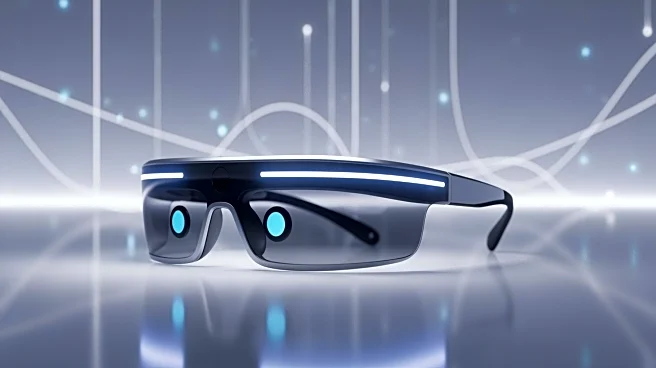What's Happening?
In October 2025, several companies have announced significant advancements in augmented reality (AR) technology, aiming to integrate AR into everyday life. Meta has unveiled new smart glasses featuring a display and wristband controller, designed to simplify
AR interactions. Snap has announced plans to release lightweight consumer AR glasses in 2026, which are expected to increase hardware availability and comfort for everyday use. Additionally, Niantic has updated its Peridot AR game to include voice-driven tour-guide features, enhancing user interaction with AR companions. These developments signal a shift from experimental AR applications to practical, daily tools, with companies betting on broader consumer adoption.
Why It's Important?
The advancements in AR technology by Meta, Snap, and Niantic are poised to significantly impact consumer technology and the way users interact with digital environments. By simplifying controls and enhancing comfort, these companies are addressing key barriers to widespread AR adoption. The introduction of voice-driven features and biometric sensors in AR devices could revolutionize sectors such as tourism, fitness, and navigation, offering personalized and interactive experiences. As AR technology becomes more accessible, it could lead to increased investment in developer ecosystems and hardware, potentially reshaping the consumer tech landscape.
What's Next?
With Meta and Snap planning to release new AR glasses, the next steps involve consumer trials and feedback to refine these products for mass-market adoption. Developers are expected to create applications that leverage the new features, such as voice interaction and biometric inputs, to enhance user experiences. Industry leaders are closely monitoring these developments, as successful integration into daily life could lead to a surge in AR-related investments and innovations. The year 2025 is seen as pivotal, with companies aiming to prove the utility of AR technology beyond niche applications.
Beyond the Headlines
The integration of AR technology into everyday life raises questions about privacy and data security, particularly with the use of biometric sensors and voice interactions. Ethical considerations regarding user consent and data usage will need to be addressed as these technologies become more prevalent. Additionally, the development of prescription lenses for AR glasses could further accelerate adoption, making AR accessible to a wider audience. The cultural impact of AR technology, including changes in how people interact with their environment and each other, will be an area of ongoing exploration.















